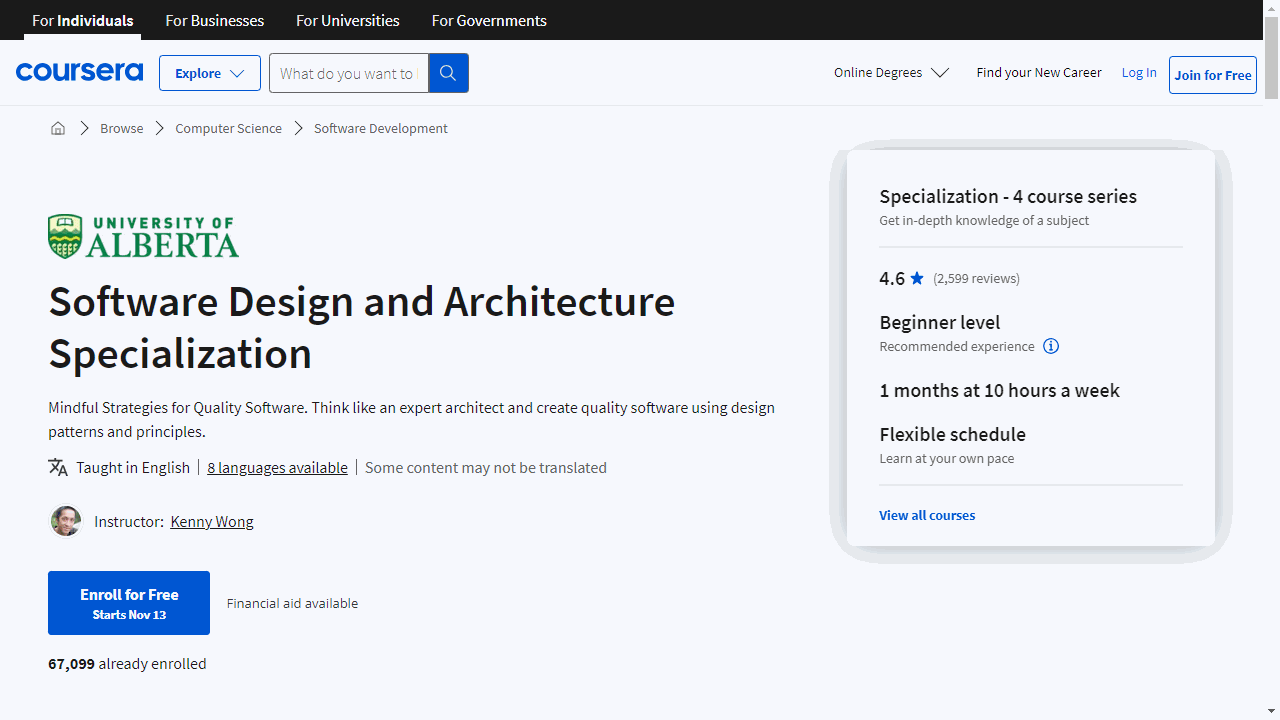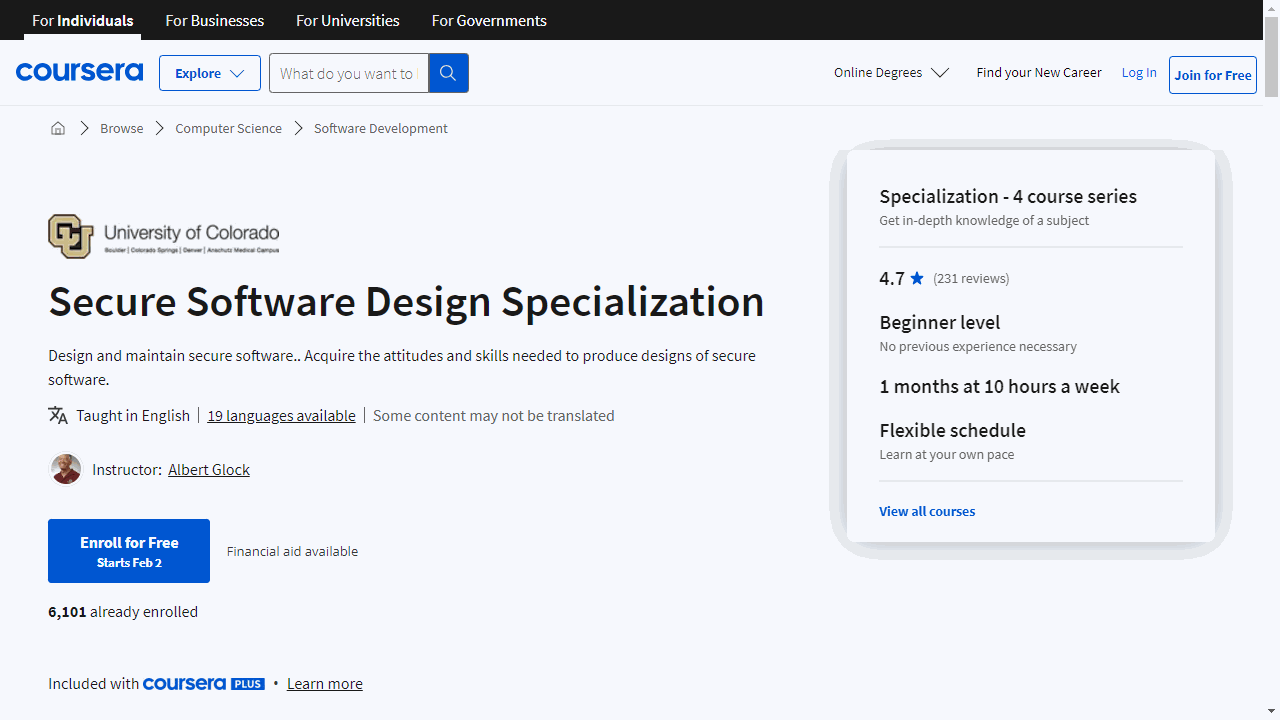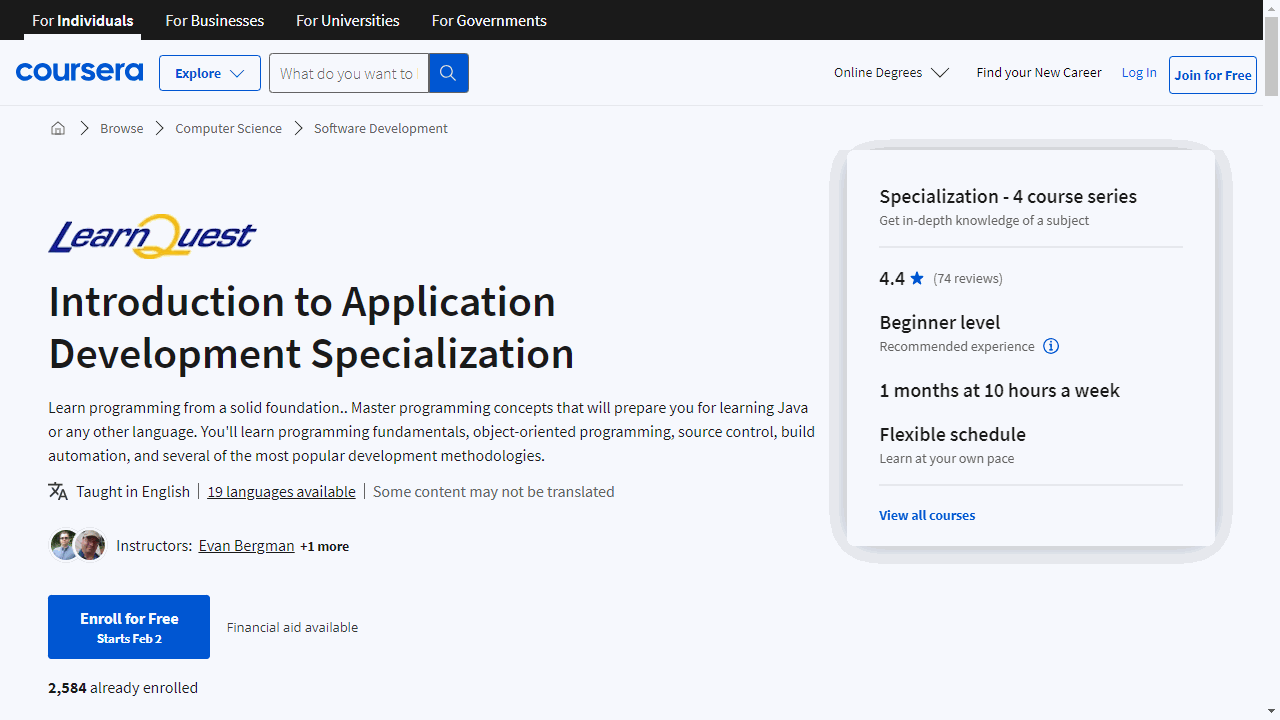Software design is the process of defining the architecture, modules, interfaces, and data structures of a software system.
It involves translating user requirements into a detailed plan that guides the development process.
Choosing the right course can be daunting, especially with so many options available on Coursera.
You’re looking for a comprehensive course that will help you master software design principles and techniques, and gain the skills needed to create robust and scalable software systems.
You want a course that’s engaging, practical, and taught by experts, but you also want to ensure it aligns with your learning style and goals.
For the best software design course overall, we recommend Software Design and Architecture Specialization.
This specialization is designed to elevate your understanding of software design, from object-oriented programming to architectural styles.
You’ll gain hands-on experience with Java, UML, design patterns, and service-oriented architecture through practical projects and case studies.
However, this is just one of many great options.
Keep reading to discover our top picks for software design courses on Coursera, covering a range of learning styles, areas of focus, and expertise levels.
Software Design and Architecture Specialization
This series of courses is designed to elevate your understanding of software design, from the principles of Java to the complexities of various architectural styles.
The journey begins with “Object-Oriented Design,” where you’ll delve into advanced Java concepts.
This course is essential for mastering the art of crafting flexible and maintainable software.
You’ll learn to apply object-oriented principles and express your designs using UML.
The practical Capstone Project puts your skills to the test, as you refine and document a Java codebase for an Android application.
Moving on to “Design Patterns,” you’ll discover the templates that guide the creation of reliable and scalable software.
This course empowers you to identify and implement the right design patterns for your projects.
You’ll also learn to recognize code smells, which are indicators of potential problems in your code, and how to address them.
The ability to critique and refactor Java code is a valuable skill you’ll gain from this course.
In “Software Architecture,” the focus shifts to the high-level structure of software systems.
You’ll compare architectural styles and understand their implications on your projects.
Creating UML diagrams and evaluating architectures using ATAM are just a couple of the practical skills you’ll acquire.
This course ensures you have the tools to design systems that are both functional and robust.
Lastly, “Service-Oriented Architecture” introduces you to the principles of designing web-based systems.
You’ll explore SOA, Web Services, and REST architecture, learning how to integrate and implement these approaches in your applications.
The course culminates in a Capstone Project where you’ll connect an Android application to a web service, solidifying your understanding of these essential concepts.
Secure Software Design Specialization
Provider: University of Colorado System
This series of courses dives deep into the essentials of software design, a key phase in the software development lifecycle, tailored to enhance your understanding and skills in this field.
The journey begins with “Software Design as an Element of the Software Development Lifecycle.”
This course illuminates the critical role of design in software development, explaining why it’s an indispensable step across various development methodologies.
It’s perfect if you’re curious about the foundational importance of design in creating software.
Following that, “Software Design as an Abstraction” explores the unique aspect of using visuals in software design.
It delves into why drawing and visual representations are central to design, offering insights into how pictures can convey details and context in ways other forms cannot.
If the visual aspect of design intrigues you, this course will enrich your understanding.
“Software Design Methods and Tools” caters to those with a coding background, introducing tools and techniques to streamline the design process.
It also touches on ethical considerations in software development, equipping you with both tangible and intangible tools to fulfill your design responsibilities more effectively.
If you’re looking to enhance your design workflow with practical tools, this course is tailored for you.
Lastly, “Software Design Threats and Mitigations” revisits the significance of visuals in design, this time focusing on identifying and mitigating potential software threats.
It’s an excellent choice if you’re interested in safeguarding your software projects, offering strategies to protect against vulnerabilities.
Introduction to Application Development Specialization
Provider: LearnQuest
This series of courses provides you with essential skills in application development, focusing on object-oriented programming, essential development tools, and modern development methodologies.
The journey begins with “Application Programming Fundamentals,” where you’ll dive into object-oriented programming’s core concepts using Python.
This course covers everything from objects and classes to inheritance and polymorphism, offering hands-on labs for practical experience.
It’s an ideal starting point if you aim to master computer programming logic and design patterns in an accessible manner.
Following that, “Object-Oriented Programming Concepts” deepens your understanding of OOP.
You’ll explore advanced topics such as UML, methods, and classes, enhancing your ability to structure programs effectively.
This course is crucial for those looking to refine their programming skills and grasp complex OOP principles.
In “Essential Tools For Application Development,” you’ll get acquainted with Version Control Systems and Build Automation Tools, focusing on Apache® Subversion® and Apache® Maven™.
This course is key to learning how to manage code changes and automate builds, streamlining your development process.
Lastly, “Development Methodologies Overview” introduces you to vital development frameworks, including the Software Development Lifecycle (SDLC), Agile, Continuous Integration/Continuous Delivery, and 12 Factor for cloud development.
This course ensures you understand how to collaborate effectively in teams and follow essential development steps.



